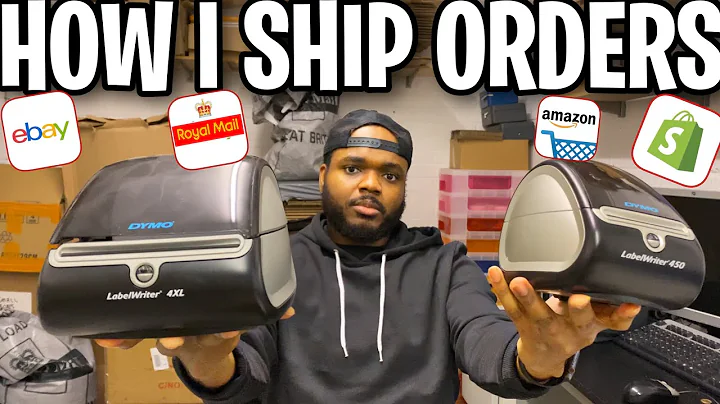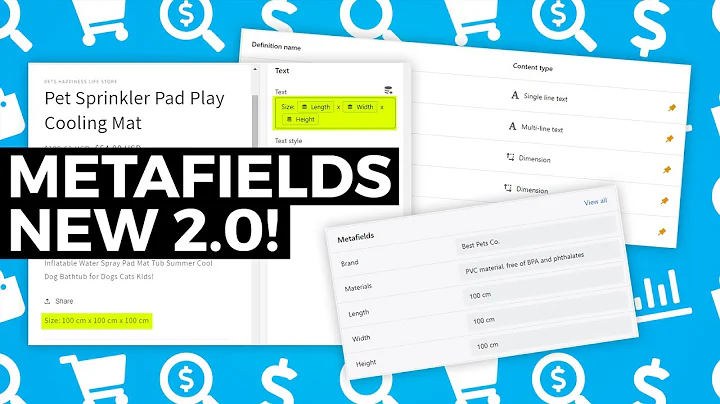Start Your E-Commerce Journey with Shopify
Table of Contents
- Introduction: What is Shopify?
- Benefits of Shopify
- Comprehensive e-commerce platform
- Easy website building with customizable templates
- Ability to sell various types of products
- Point of Sale (POS) opportunities
- Integration with social media platforms
- Secure payment processing
- Inventory tracking and low inventory alerts
- Analytics for optimization
- Blogging capabilities
- Integration with other software and plugins
- Drawbacks of Shopify
- Limited customization compared to other platforms
- Monthly fees and transaction fees
- Examples of successful Shopify stores
- Anchor
- Oregon
- Kylie Cosmetics
- Climate
- Conclusion: Why Shopify is a top choice for online stores
What is Shopify and How Does It Work?
Shopify is a powerful e-commerce platform that enables individuals and businesses to set up and run their own online stores with ease. It provides a comprehensive solution for selling products and services online, offering a wide range of features and functionalities. With millions of merchants using Shopify, it has become one of the most popular choices for building successful online stores.
Benefits of Shopify
Comprehensive e-commerce platform
Shopify is a complete solution for running an online store. It automates many essential tasks, such as inventory management, order tracking, and payment processing, allowing you to focus on growing your business. It offers a wide range of features that cater to different aspects of e-commerce, making it an all-in-one platform for selling online.
Easy website building with customizable templates
One of the key advantages of Shopify is its user-friendly website builder. With a wide selection of customizable templates, you can easily create a stunning and professional-looking website without any web development background. The templates serve as a starting point, allowing you to customize the design, fonts, colors, and images according to your brand's needs.
Ability to sell various types of products
Shopify offers flexibility when it comes to the types of products you can sell. Whether you're selling physical products, digital goods, services, or gift cards, Shopify provides the necessary tools to showcase and sell your offerings. It even supports point of sale (POS) transactions, allowing you to sell products in person through your Shopify store.
Integration with social media platforms
Shopify seamlessly integrates with popular social media platforms, such as Instagram, Facebook, and Pinterest, enabling you to create storefronts and sell directly through these channels. This integration expands your reach and opens up new opportunities for reaching potential customers.
Secure payment processing
Shopify provides its own payment processing system, known as Shopify Payments. However, it also allows you to accept payments through other methods, including PayPal and various credit card processors. This ensures that your customers have a secure and convenient payment experience, increasing their trust and confidence in your online store.
Inventory tracking and low inventory alerts
Managing inventory is made easy with Shopify. You can track your inventory, monitor stock levels, and receive low inventory alerts. This helps you stay informed about the availability of your products, ensuring you never run out of stock and miss out on potential sales.
Analytics for optimization
Shopify offers robust analytics tools that provide valuable insights into your store's performance. You can track metrics such as website visitors, conversion rates, and cart abandonment. By analyzing these data points, you can optimize your store, identify areas for improvement, and make data-driven decisions to boost sales and revenue.
Blogging capabilities
In addition to its e-commerce features, Shopify also allows you to create and manage a blog. This feature provides an opportunity to enhance your brand's online presence, engage with your audience, and attract organic traffic. By utilizing content marketing strategies, such as sharing recipes or top product lists, you can drive more visitors to your store and increase the chances of making sales.
Integration with other software and plugins
Shopify offers a vast library of apps and plugins that integrate with its platform. These integrations extend the functionality of your store and allow you to enhance various aspects, such as marketing, email campaigns, and print-on-demand services. Whether you need additional marketing tools or want to streamline your order fulfillment process, Shopify's integrations have got you covered.
Drawbacks of Shopify
While Shopify offers numerous advantages, it's important to acknowledge some of its drawbacks as well.
Limited customization compared to other platforms
Compared to other platforms like WordPress, Shopify has some limitations when it comes to customization options. While the available templates are highly customizable, more advanced customization may require extensive coding knowledge or hiring a developer. If you have unique design requirements, you might find that other platforms offer more flexibility in this aspect.
Monthly fees and transaction fees
Shopify operates on a subscription-based model, which means you'll need to pay a monthly fee depending on the plan you choose. In addition to monthly fees, Shopify also charges transaction fees for each sale made through the platform, unless you use Shopify Payments. These fees can add up, especially for businesses with high sales volume, and should be taken into account when considering the overall cost of running an online store with Shopify.
Examples of successful Shopify stores
Shopify is trusted by numerous successful brands and businesses. Here are a few notable examples:
-
Anchor: Anchor is a reputable brand that specializes in electronics such as battery banks, chargers, projectors, and headphones. They use Shopify as their platform for selling their products.
-
Oregon: Oregon is a well-known brand that produces protein powder and is commonly found in grocery stores. They rely on Shopify to handle their online sales.
-
Kylie Cosmetics: Kylie Cosmetics, owned by the Kardashian family's Kylie Jenner, is a massive brand that has built a successful online store using Shopify.
-
Climate: Climate is a brand that sells camping pads and sleeping pads. They have designed their Shopify store with an outdoorsy feel to match their products.
These examples demonstrate the versatility and scalability of using Shopify for building successful online businesses.
Conclusion
Shopify is a comprehensive and user-friendly e-commerce platform that offers a wide range of features and benefits for individuals and businesses looking to create an online store. It simplifies the process of setting up and managing an online business, allowing you to focus on your products and customers. With its customizable templates, secure payment processing, inventory tracking, and integration capabilities, Shopify has become a top choice for entrepreneurs and established brands alike. Despite some limitations in customization and associated costs, the overall ease of use and robust features make Shopify an excellent option for anyone looking to enter the world of e-commerce.
FAQ
Q: Can I use my own domain name with Shopify?
A: Yes, Shopify allows you to use your own custom domain name or purchase one through their platform.
Q: Can I sell internationally with Shopify?
A: Yes, Shopify supports multi-currency selling and provides options for international shipping and taxation settings.
Q: Can I migrate my existing online store to Shopify?
A: Yes, Shopify provides tools and resources to help you migrate your store from another platform seamlessly.
Q: What are some popular Shopify apps for marketing?
A: Some popular Shopify apps for marketing include MailChimp for email campaigns, SEO Manager for optimizing your store's search engine visibility, and Privy for capturing and converting website visitors into customers.
Q: Does Shopify offer customer support?
A: Yes, Shopify provides 24/7 customer support through various channels, including live chat, email, and phone. They also have a large community forum and extensive documentation to help users troubleshoot issues.
Q: Can I use Shopify for dropshipping?
A: Yes, Shopify supports dropshipping and offers integrations with various dropshipping apps and services, such as Oberlo and Printful.
Q: Can I try Shopify before committing?
A: Yes, Shopify offers a free trial period, usually for 14 days, allowing you to explore and test its features before deciding to sign up for a paid plan.


















